VPN For Beginners - All You Need To Know
20 min. read
Updated on
Read our disclosure page to find out how can you help VPNCentral sustain the editorial team Read more
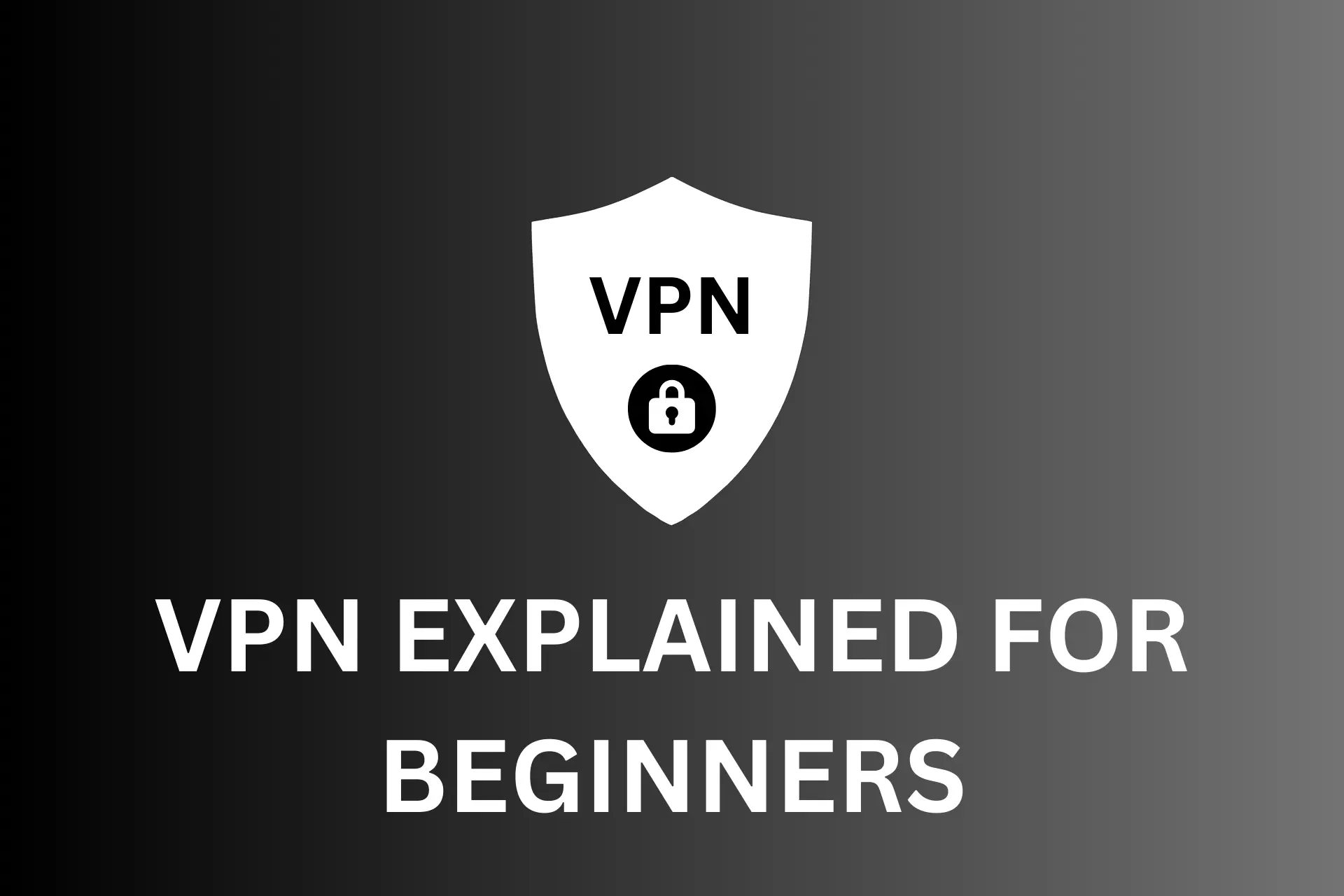
A Virtual Private Network, simply called VPN, is a service in the form of handy software that allows subscribed users to connect to the internet via an encrypted tunnel.
All information transferred between your device and a VPN server is securely encrypted before it is sent out to the internet.

Access content across the globe at the highest speed rate.
70% of our readers choose Private Internet Access
70% of our readers choose ExpressVPN

Browse the web from multiple devices with industry-standard security protocols.

Faster dedicated servers for specific actions (currently at summer discounts)
Simply put, a VPN hides internet operations and activities between your PC, smartphone, tablet, etc., and the host server.
The internet is a public space where almost all activities you conduct online are visible.
What is a VPN?
A VPN is mainly designed to make your internet activities invisible thus making you appear anonymous and private every time you are browsing or surfing.
All this information may sound confusing if you do not have any experience with VPNs.
If you are a beginner, it may not be easy to select the best VPN for you.
For this reason, we put together this guide that will give you some basic information about VPNs and a few hints on how to choose the best VPN for your specific needs.
How does a VPN work
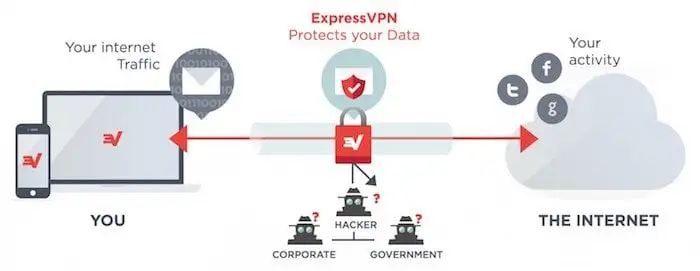
When you connect to the Internet without a VPN, you do so using your ISP’s server. From the server, your ISP can then view all your online activities.
They can see the website you are visiting, and the kind of data you are accessing.
Not only that, they can even create a pattern of your usual internet activities. They can know the sites you visit at a particular time and even the location you visit from.
Scary, huh?
But, as mentioned, when you connect to a VPN service, all your internet traffic will be encrypted and then sent to a server located in a different location in the world.
To link to a particular VPN service, you will need to have a VPN client installed on your device, and then log in using your credentials.
Your computer, smartphone, tablet, or whatever device you’re using to connect to the internet will then share trusted keys with a server that is located in a different location in your country or around the world.
Once your device and a remote server have verified each other’s authenticity, you are then connected.
It is the VPN server that connects you to the Internet, and not your ISP server anymore.
This way, you are also secured from hackers and the prying eyes of the government.
Does a VPN guarantee full anonymity?
It is important to note that a VPN does not provide you with full anonymity since your VPN service provider can still know your real IP address.
However, you’re shifting your trust away from your internet service provider (ISP) who has no interest whatsoever or any commitment to protecting your privacy, to a VPN service provider whose sole purpose is privacy.
Though you can’t get 100% anonymity, connecting to a good VPN boosts your security, anonymity, and privacy.
Fake promises by VPNs
VPNs can promise you the world of total online freedom, but not all VPNs prove true to their claims.
For instance, if they keep logs, anonymity is just an empty promise. If a data protection agency gets a court order to retrieve user details, such a VPN will always give you up.
Other VPNs promise you zero logs and only minimal details are kept.
Make sure to know what these details are. We have seen a case of Hotspot Shield submitting connection logs to the FBI in August 2017.
That means that if you want to trust a VPN, first make sure that they offer a strict no logs policy.
The no-logs issue
The issue of VPN and logs has long been a bone of contention.
Some VPN providers say that they keep no logs, others talk of zero logs and a few others say that they keep no logs of any kind.
What VPNs mean when they say that they keep no logs is that they don’t keep usage logs.
However, most of them keep connection logs.
Usage logs are the most dangerous for your privacy since they expose a lot of information about your Internet activity including which websites you visited.
If your VPN provider collects usage logs, your privacy is at risk.
Connection logs instead are metadata about the user’s connections. That includes the time of connection, and for how long but not necessarily their identity.
Providers usually say that these logs are only meant to help deal with technical issues and instances of abuse.
In reality, they are not too much of a concern since connection logs are not a threat to your privacy.
However, such details can be used to carry out an end-to-end timing attack even though this is very unlikely to happen.
Real-time tracking
It’s important to note that even if a VPN provider doesn’t keep logs, they can always monitor your activities in real-time.
In usual circumstances, they do it for troubleshooting purposes, especially with providers who don’t keep usage logs.
Even though providers promise not to monitor your activities, they can do this when served with a court order.
However, this only happens in cases where one is already at logger’s heads with authorities. For the average VPN user, you don’t have to worry about this.
Shared IPs
Shared IPs are a crucial part of privacy.
That is an IP address that is used by many users. With such an IP, no one can associate it with a particular user behavior.
Hundreds of users share this IP, and so you cannot easily single out a specific user.
Mandatory data retention
Where a VPN is incorporated is a critical factor in determining the kind of privacy you can get from a VPN. The location specifies the laws under which the VPN operates.
There are countries with strict data retention laws, and therefore a VPN based in such a Country can’t deliver on zero-logs no matter what they promise you.
A good example here is the one of VPNs based in the US, the UK, and Australia.
You should, therefore, try to choose a VPN based in a friendly country. Favorite VPN locations include Panama, the Virgin Islands, Romania, and Luxembourg.
Anonymous payments
Sometimes you don’t want to be traceable even by the VPN providers.
This calls for anonymous modes of payment, something that more privacy-minded providers have implemented.
Some accept a wide range of coin payments, with Bitcoin being the most common.
Paying for your VPN using Bitcoin ensures that you don’t leave your identity behind.
However, it’s not entirely foolproof as the VPN provider can still access your IP.
Nevertheless, Bitcoin payment gives a good chunk of anonymity, and we highly encourage it. You can even pay with Bitcoin while using another VPN on a premium free trial!
So what do I do for full anonymity?
A VPN can’t promise you total privacy, especially not if the police, government, or the NSA, are specifically interested in you.
What you can do is use Tor instead. It has long been used by journalists, whistleblowers, and other users who are in need of 100% anonymity.
However, Tor comes with issues that make it difficult to use it as your primary network.
For instance, due to the high encryption level, Tor connection is very slow and just watching a video or streaming content is almost impossible while connected to Tor.
The other option that can get close is using VPN through Tor.
Why do I need a VPN?
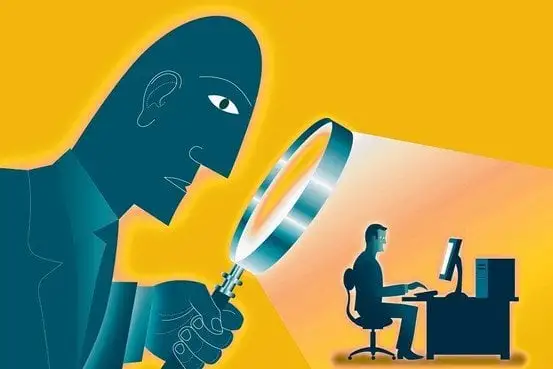
A VPN has plenty of uses, and even if you’re not using one right now, you may need it tomorrow or in the future. The following are just but some areas where a VPN comes in handy.
#1 Online protection from hackers when using public WiFI hotspots
You’re never safe when using public WiFi. The reason is that the security of such Wi-Fi hotspots is always compromised.
Thus anyone with an ill motive can quickly tap into your private information stored or shared on your laptop, smartphone or tablet.
You need a VPN to help you beef up your internet connection security when you’re using public WiFi by encrypting your internet connection traffic.
2 Extra digital security
Today, we live most of our lives online, ranging from personal photos to finances and personal health records.
VPN beefs up your internet security by encrypting your connection thus protecting you from prying eyes.
#3 Evade censorship
Various governments across the world, institutions, and even Internet Service Providers (ISP) usually censor the internet operations of their citizens or have mounted intrusive surveillance on their internet activities.
Censorships restrict you from accessing specific internet resources, but a good VPN restores your internet freedom by circumventing censorship.
#4 Safe and secure torrent downloads
Whether you’re engaging in a legal or illegal download, you don’t want to end up being on some firm’s witch-hunt.
People don’t always use torrents to access pirated movies.
You may need a torrent for genuine reasons like updating your Linux ISO or games. A VPN keeps you safe when using apps like BitTorrent.
#5 VOIP Communication
Despite the fact that various companies have enhanced their email and text encryption, there still exist loopholes in VOIP security.
That is mainly chat and video calls that you make over services like Skype.
You need a VPN to provide you with extra encryption and security when chatting and video calling with your friends on such platforms.
These are some of the benefits of using a good VPN. Many more you will discover when your VPN is active.
Is VPN legal?
Yes, VPNs are legal in most countries where citizens have the legal right to privacy.
Only repressive nations like China, who significantly restrict their citizens internet access, usually make VPNs challenging to use.
These countries usually make it hard for VPN services to operate in their soil and often block their citizens from accessing VPN services abroad.
However, even China with its sophisticated internet censorship system has never fully managed to block VPN access.
The reason as to why the country can’t wholly block or ban VPN usage is because most international businesses rely on VPNs for communication and secure transmission of data.
Prohibiting VPNs would jeopardize the operations of these businesses, which would adversely affect the economy.
However, the US and some European governments have introduced wide-ranging internet surveillance, and in countries like UK and France, VPN service providers are required to keep user’s logs activity.
It is therefore wise to avoid VPN services based in such countries if you’re looking for privacy.
Preferably go for VPN providers registered in countries that have no legal requirements for user log keeping.
Typical examples are VPN based in Panama, VPN with headquarters in Romania, VPN services in the Virgin Islands and VPN under Hong Kong jurisdiction.
How is a VPN different from a proxy?
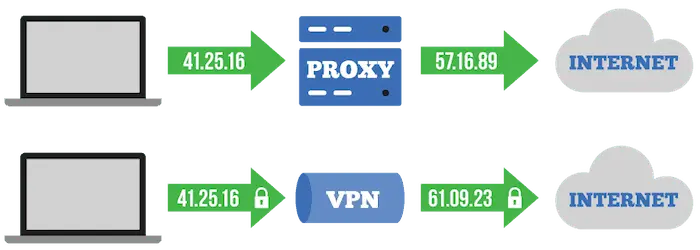
You may have heard of how a proxy server can be used to change your IP address, something that a VPN is well known for. However, there’s one significant difference between a VPN and a Proxy.
When you connect to a proxy server, it only comes in as an intermediary between your device and the internet.
The proxy server then re-routes your traffic making it appear as if it is from this servers IP address. This way it can mask your IP address and help you access restricted content.
A VPN does all these, and then adds something crucial; encryption and security.
Before your traffic leaves the device, a VPN first encrypts it, and then sends it through a secure tunnel.
That ensures that your traffic cannot be intercepted by third parties, hence preventing you from the dangers of hackers and identity thieves.
Another crucial difference between Proxy and VPN is the level of protection.
While a VPN protects all your device and its applications, the proxy protects only the single application you are using to connect to the internet.
Is there anything like a free VPN?
Technically and financially speaking, there is nothing like a free VPN.
Yes, the so-called free VPN services are available but these are severely limited in one way or the other, or just cannot be trusted in that they share a users’ data.
Running a VPN service is expensive, and so you can hardly imagine one operating for charity.
Most free VPNs end up costing you tomorrow.
Some inject cookies on your device to enable advertisers to target you with ads.
They also run so many ads in a bid to keep the VPN running, as well as to get some profits. Worst of all, they may end up selling your data to third parties.
That said, there are some popular free VPN services. These free plans, however, offer limited access features, and you may not get total encryption or privacy.
It is important to note that you cannot get all the privacy benefits and stellar performance with a free VPN and therefore you need to subscribe to an excellent commercial VPN service.
The following are some of the most trusted VPN service providers.
Best VPNs for beginners
1. ExpressVPN
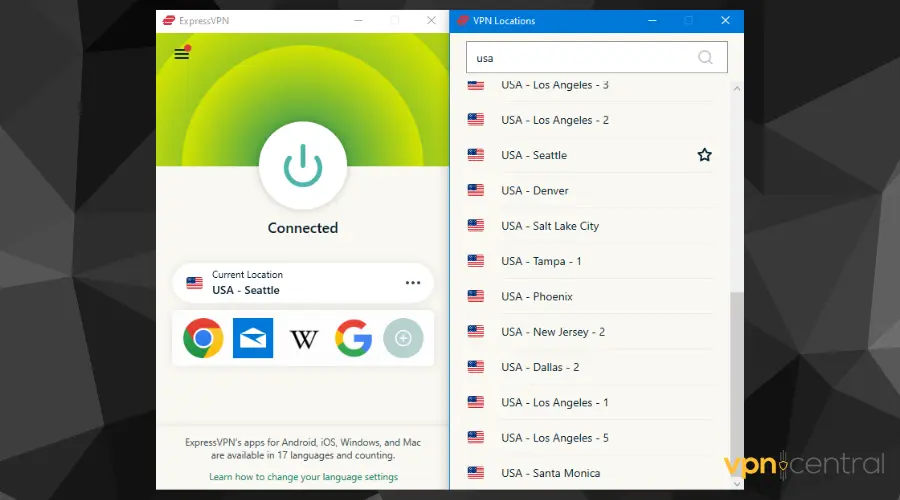
ExpressVPN has servers located in 94 countries across the globe, offering great privacy and robust encryption that keeps hackers away.
Having stayed in the industry since 2009, ExpressVPN has invested in VPN technology and continually improves its services to meet clients’ needs and demands.
Being based in the Virgin Islands, ExpressVPN is a strict no-logs VPN provider.
Users all over the world can enjoy the new Smart Domain Name System (DNS) service that comes free with all ExpressVPN accounts.

ExpressVPN
Connect to ExpressVPN for fast and secure web surfing!2. CyberGhost
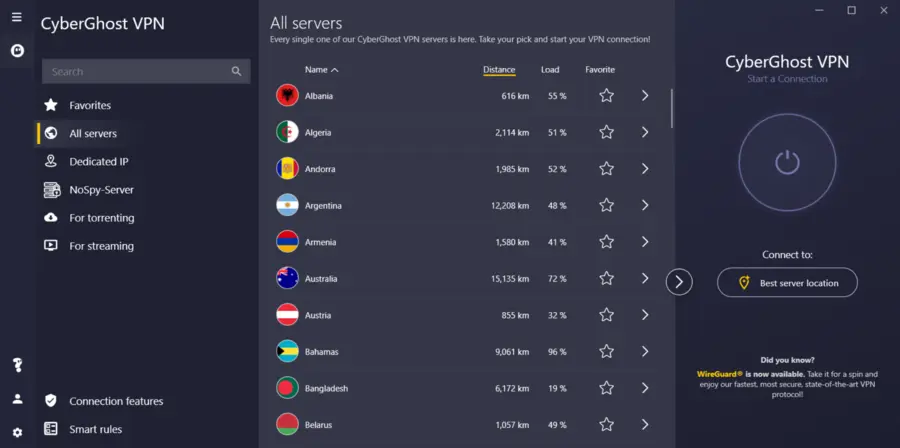
CyberGhost entered the VPN service industry in 2011. It has since then come out to be a strong supporter of a free society with uncensored in internet access.
It features a robust Linux support, VPN support via routers and offers a solution for Kodi Media player.
CyberGhost also comes with a kill switch feature and supports both P2P and BitTorrent in most countries across the world.
Users get customized app protection, DNS, IP and IPV5 support as well as WebRTC leak prevention.
The VPN is based in Romania and preserves anonymity by not logging user activities.

CyberGhost
Protect your data with this reliable and easy to use tool!3. NordVPN
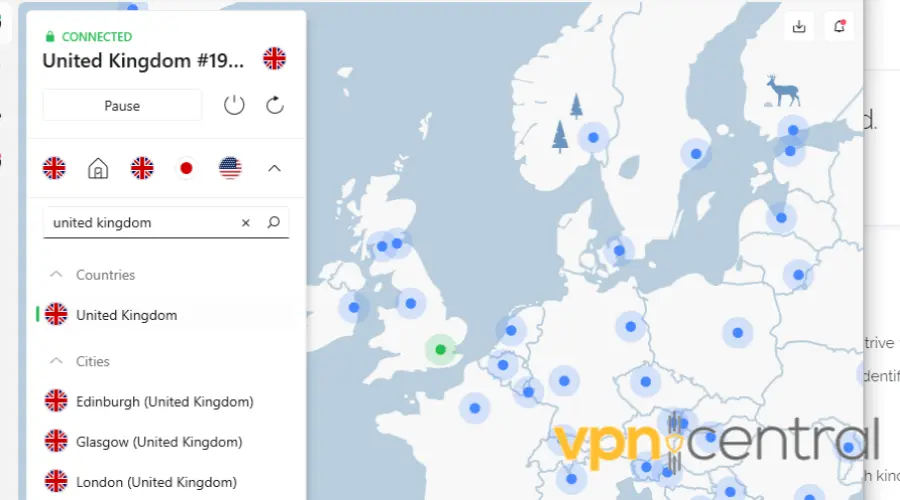
Nord VPN is one of the best services with more than 2,000 servers in 60 countries across the globe and dedicated IP addresses.
This VPN service doesn’t compromise on clients internet security as it features double VPN, military-grade encryption, strict no-log policy and an automatic kill-switch.
NordVPN is registered in Panama which is a very friendly country regarding internet freedom.
That dramatically helps the VPN in implementing a Zero logs policy, and we’ve heard of many cases of NordVPN refusing to submit user data even when directed to do so.

NordVPN
Get the best online privacy features using this top-tier VPN!4. IPVanish
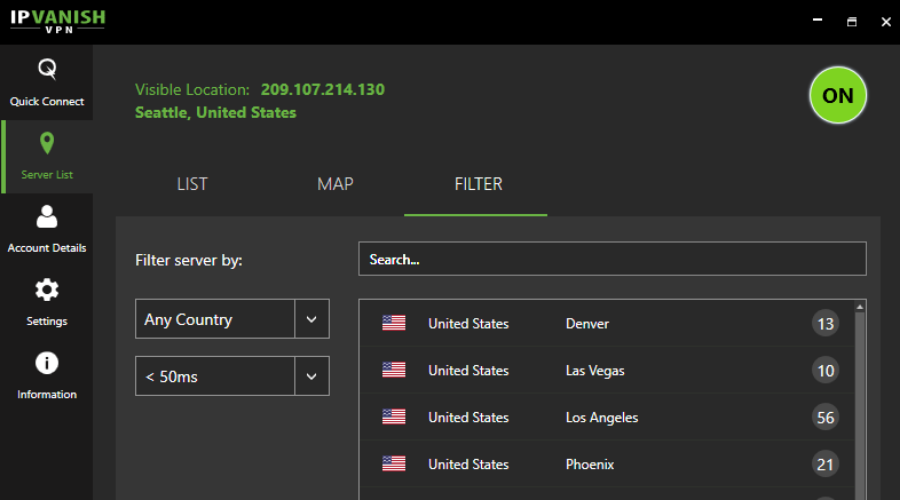
IPVanish has a strong selling point in that they fully own their infrastructure, making the VPN top-tier.
It also has a massive network of servers with 950+ VPN servers across 60+ countries, using 40,000+ shared IPs. Their speeds are also admirable.
Not only that, IPVanish has obfuscation features that make it useful in highly censored countries like Iran. These feature breaks down OpenVPN traffic and disguises it as regular HTTPS traffic, hence avoiding being blocked.
The only problem with this vpn is that it’s based in the US, something that doesnât work well for total privacy.
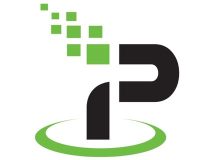
IPVanish
Improve your online privacy and bypass restrictions with IPVanish!5. PureVPN
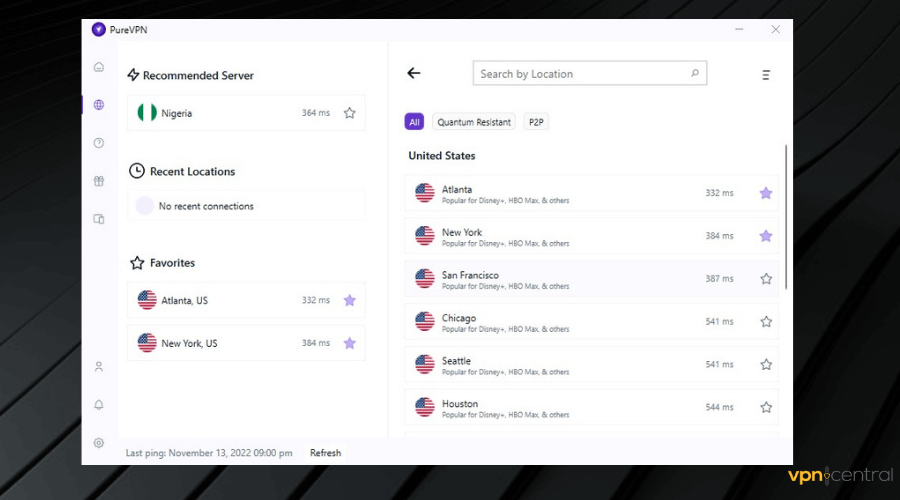
PureVPN features more than 750 servers located in more than 140 countries. It comes with an extensive network and excellent protocol support.
Since the company is based in Hong Kong, they have a strict privacy policy, and the VPN keeps zero traffic logs, hence ensuring maximum anonymity.
PureVPN enables you to use split VPN tunneling, which is very helpful when you want to encrypt certain parts of your internet activity while still on a regular network connection for other things.
One unique feature of PureVPN is their virtual router which allows users to turn their Windows PC into a virtual router for connecting up to 10 devices for other VPN requirements.

PureVPN
Shield your data and get online freedom by connecting to PureVPN.How do I choose the best VPN?
There are scores and scores of VPN providers today, so knowing how to choose among them is a big favor you can do for yourself.
The list of VPNs above will guide you into making sure that you don’t make a mistake, but choosing the best VPN for you ultimately depends on your needs.
That is because VPNs are not made equal, and each one has its strong and weak points.
Nevertheless, here are some considerations while choosing among the VPNs;
Price
Price is one of the most obvious factors. VPN prices average $8-$10 per month. These prices, however, come down significantly if you subscribe for a longer duration. One-year subscriptions can even bring them down to $3 a month.
However, the price you pay for a VPN should match the amount of VPN you get regarding features and speeds offered.
Speed
VPNs almost always result in speed drops.
However, some VPNs are just terrible in speeds, so you need to make sure that you won’t subscribe to a VPN that won’t let you stream in HD.
Security & privacy
While some may need a VPN for circumventing geo-restrictions, you may need it for total online protection. In such a case, you need to invest in a VPN that is entirely focused on security and privacy.
Your VPN needs to keep zero logs, offer an automatic Kill Switch, and have DNS leak protection.
A VPN that keeps zero logs is excellent for privacy. The reason why we want to get away from our ISP is because they always spy on us and can produce data about our online activities at any time.
For instance, it is a common practice for ISP to throttle your connection if you access a lot of streaming content, which is clear evidence that they can monitor your activity.
Choosing a VPN provider that keeps zero logs will mean that even if a court order demands your data, your VPN provider can’t implement it.
After all, they can’t provide what they don’t have!
A Kill Switch, on the other hand, is a super useful tool that disables all your online connections once you lose your VPN connection.
That prevents your identity from leaking out when the VPN is not connected. Such is very useful for example in a situation where you want to leave your computer downloading some torrents.
In the case the VPN connection suddenly drops, your privacy will stay safe anyway.
DNS Leak protection is also useful in protecting your identity. The feature makes sure that all sites and parties can only see your VPN DNS and IP, protecting you from exposure.
Number & location of servers
A vast server network ensures that you don’t get clogged on one server with many other users, something that has a detrimental effect on speeds.
Further, a VPN that has servers near you is a safer bet at offering better speeds. The shorter the distance between you and the server, the higher the quality of the connection regarding speeds.
Multiple device support
If you just want to secure your PC for safe downloads, then you donât have to worry about this. However, if you have many devices that you want to protect or want to keep your entire family safe, then you should go for a VPN that offers 5 or more simultaneous connections.
Obfuscation technology
Obfuscation is a consideration for those who want to use a VPN in highly censored countries like Iran, China, Turkey, Egypt, and so on.
These countries block OpenVPN traffic, so you need a VPN that can disguise OpenVPN packets as regular HTTPS traffic.
Customer support
With a VPN, you will always have something that you may need clarification with. For this, your VPN needs to have superb support.
The knowledge base needs to be well-stocked with tutorials, guides, and FAQs. Preferably the VPN should have 24/7 live chat support that can answer your questions at any time.
Software
A good VPN client should look good as well as be easy to use. Further, it should offer you some advanced features to give more value to your money. Some VPNs even have ad-blockers and malware blockers.
Cross-platform support
The VPN you subscribe to should be able to offer clients for most of your devices. It should at least run on Mac, Windows, Android, and iOS. Some VPNs have router versions and browser add-ons.
Free trials and a money-back guarantee
Before you fully commit your wallet to a VPN, you need to make sure that it’s the right VPN for your needs.
Some VPNs have free trials. If not, make sure that the VPN has a money-back guarantee that you can activate.
Can I torrent safely using a VPN?
Torrenting is most often considered illegal, and you should not attempt to download torrents without proper protection. Some VPNs allow torrenting, and that will make you safe while torrenting.
This is as long as your VPN service provider does not keep usage logs.
In case they do, you may be secure but not private. Remember they can always provide data about you.
While torrenting, people downloading the same file can easily see your IP address, and hence the name P2P and File sharing.
When you are connected to a VPN, any person that is tracking you can only see your VPN’s IP address, and not your real address keeping you safe.
However, not all VPN providers allow P2P. You should, therefore, choose your provider carefully if you are a fan of torrenting.
The ones that don’t allow most fear getting bombarded with copyright infringement notices, while others just don’t want to risk their users.
If your VPN provider keeps zero logs and allows P2P, you will be safe while using a VPN.
What VPN does not do
A VPN may provide huge benefits to your online protection (with the major ones being security and privacy), but it surely doesn’t do everything.
Here are a few things that a VPN doesn’t do:
Provide 100% Anonymity
When faced by authorities, most VPNs do not want to do anything that can harm their businesses, so you can expect them to cooperate. You would do better than trust a VPN for full anonymity.
Prevent Tracking
While using a fake IP address dramatically helps, websites now use cookies to track you. This is something that a VPN can’t defend against, but you can use a browser add-on like Privacy Badger.
Conclusion
Internet privacy and freedom are slowly becoming a thing of the past. Some governments are doing so much to gain control over what their citizens can do or see on the internet, and cyber threats are also increasing day by day.
Here at Anonymster, we believe that every netizen should have control over their Internet freedom. If you feel that other people are a threat to this, then the only solution you have is to use a VPN.
You don’t have to expose yourself to cyber criminals, let people see what you are doing online, or face legal charges for using the internet in a forbidden manner.
Use a top VPN to stay safe and unlock the whole potential of the internet!







User forum
0 messages